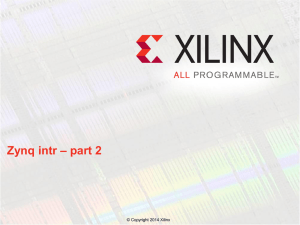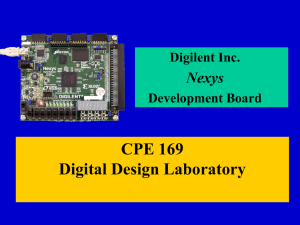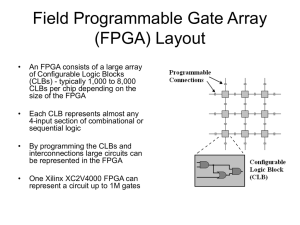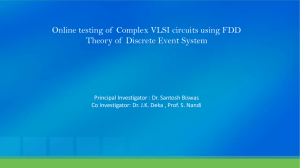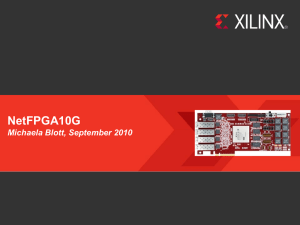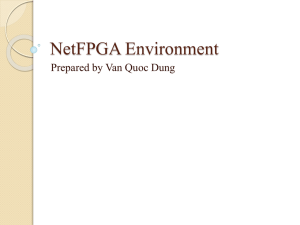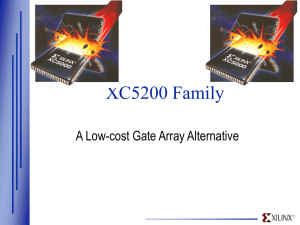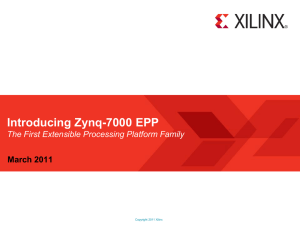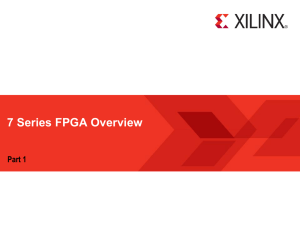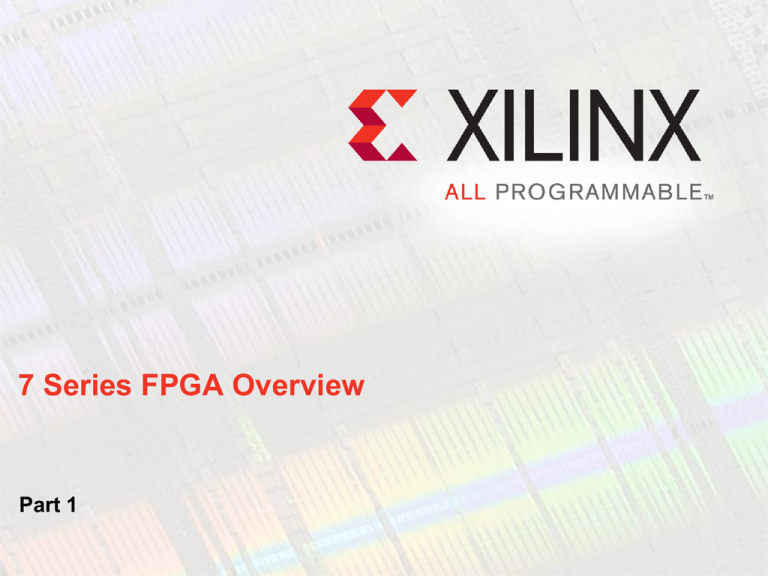
7 Series FPGA Overview
Part 1
Objectives
After completing this module, you will be able to:
Identify and differentiate the members of the 7 series families
7 Series FPGA Families
Maximum Capability
Logic Cells
Block RAM
DSP Slices
Peak DSP Perf.
Transceivers
Transceiver
Performance
Memory Performance
I/O Pins
I/O Voltages
Lowest Power
and Cost
Industry’s Best
Price/Performance
Industry’s Highest
System Performance
Virtex-7 Devices
The Virtex-7 family has several devices
– Virtex-7:
General logic
– Virtex-7XT: Rich DSP and block RAM, higher serial bandwidth
– Virtex-7HT: Highest serial bandwidth
Virtex-7
Virtex-7XT
Virtex-7HT
• High Logic Density
• High-Speed Serial
Connectivity
• High Logic Density
• High-Speed Serial
Connectivity
• Enhanced DSP
• High Logic Density
• Ultra High-Speed
Serial Connectivity
Logic
Block RAM
DSP
Parallel I/O
Serial I/O
Architecture Alignment
Common elements enable easy IP reuse for quick
design portability across all 7 series families
– Design scalability from low-cost to high-performance
Artix™-7 FPGA
– Expanded eco-system support
– Quickest TTM
Logic Fabric
LUT-6 CLB
Precise, Low Jitter Clocking
MMCMs
Kintex™-7 FPGA
On-Chip Memory
36Kbit/18Kbit Block RAM
Enhanced Connectivity
PCIe® Interface Blocks
DSP Engines
DSP48E1 Slices
Hi-perf. Parallel I/O Connectivity
SelectIO™ Technology
Hi-performance Serial I//O Connectivity
Transceiver Technology
Virtex®-7 FPGA
Strong Focus on Power Reduction
Reducing
Static Power
Additional
Power Saving
Features
Integrated Analog Front End
High performance,
low power process
Transistor choice
optimization
VCCAUX
Config
Memory
5th gen. partial
reconfiguration
Before
Reduced from
2.5V to 1.8V
Reducing
Dynamic Power
Design Green by Xilinx
Fine grain clock and logic gating
Lower device
core voltage
Unused BRAM
Power Savings
Process Shrink
After
IO Design &
User Power VCCO
Saving Modes
-1 L
Xilinx
7 Series
FPGAs
+
In
Out
BRAM
Optimized Hard
Blocks
Pad
Reducing
I/O Power
7 Series Lower Power Differentiation
50% lower total power
– 65% lower static power enabled by 28nm High-Performance, Low-Power
(HPL) HKMG process
– 25%+ lower dynamic power via architectural evolution
– 30% lower I/O power with
enhanced capability
System design flexibility
– 50% lower power budget
OR
– Take advantage of additional
usable performance and capacity
at the previous power budget
50% Lower
Power
Increase Usable
Performance
O
and Capacity
R
Summary
Rich set of families to address all areas of the FPGA market
– Artix-7 family: Lowest price and power
– Kintex-7 family: Best price/performance
– Virtex-7 family: Highest performance/capacity
Unified architecture reduces learning curve for new designs
Builds on the strengths of the Virtex-6 and Spartan-6 families
Strong focus on power reduction
New architectural features for the highest performance and
lowest power
Where Can I Learn More?
Xilinx Education Services courses
www.xilinx.com/training
– Designing with 7-Series Device Families course
• How to get the most out of both device families
• How to build the best HDL code for your FPGA design
• How to optimize your design for Spartan-6 and/or Virtex-6
• How to take advantage of the newest device features
Free Video Based Training
– Part 1,2, and 3 of the 7 Series FPGA Overview
– How Do I Plan to Power My FPGA?
– What are the Spartan-6 Power Management Features?
– What are the Virtex-6 Power Management Features?
– Basic FPGA Configuration, Parts 1 and 2
Trademark Information
Xilinx is disclosing this Document and Intellectual Property (hereinafter “the Design”) to you for use in the development of designs to operate on,
or interface with Xilinx FPGAs. Except as stated herein, none of the Design may be copied, reproduced, distributed, republished, downloaded,
displayed, posted, or transmitted in any form or by any means including, but not limited to, electronic, mechanical, photocopying, recording, or
otherwise, without the prior written consent of Xilinx. Any unauthorized use of the Design may violate copyright laws, trademark laws, the laws of
privacy and publicity, and communications regulations and statutes.
Xilinx does not assume any liability arising out of the application or use of the Design; nor does Xilinx convey any license under its patents,
copyrights, or any rights of others. You are responsible for obtaining any rights you may require for your use or implementation of the Design.
Xilinx reserves the right to make changes, at any time, to the Design as deemed desirable in the sole discretion of Xilinx. Xilinx assumes no
obligation to correct any errors contained herein or to advise you of any correction if such be made. Xilinx will not assume any liability for the
accuracy or correctness of any engineering or technical support or assistance provided to you in connection with the Design.
THE DESIGN IS PROVIDED “AS IS" WITH ALL FAULTS, AND THE ENTIRE RISK AS TO ITS FUNCTION AND IMPLEMENTATION IS WITH
YOU. YOU ACKNOWLEDGE AND AGREE THAT YOU HAVE NOT RELIED ON ANY ORAL OR WRITTEN INFORMATION OR ADVICE,
WHETHER GIVEN BY XILINX, OR ITS AGENTS OR EMPLOYEES. XILINX MAKES NO OTHER WARRANTIES, WHETHER EXPRESS,
IMPLIED, OR STATUTORY, REGARDING THE DESIGN, INCLUDING ANY WARRANTIES OF MERCHANTABILITY, FITNESS FOR A
PARTICULAR PURPOSE, TITLE, AND NONINFRINGEMENT OF THIRD-PARTY RIGHTS.
IN NO EVENT WILL XILINX BE LIABLE FOR ANY CONSEQUENTIAL, INDIRECT, EXEMPLARY, SPECIAL, OR INCIDENTAL DAMAGES,
INCLUDING ANY LOST DATA AND LOST PROFITS, ARISING FROM OR RELATING TO YOUR USE OF THE DESIGN, EVEN IF YOU HAVE
BEEN ADVISED OF THE POSSIBILITY OF SUCH DAMAGES. THE TOTAL CUMULATIVE LIABILITY OF XILINX IN CONNECTION WITH
YOUR USE OF THE DESIGN, WHETHER IN CONTRACT OR TORT OR OTHERWISE, WILL IN NO EVENT EXCEED THE AMOUNT OF
FEES PAID BY YOU TO XILINX HEREUNDER FOR USE OF THE DESIGN. YOU ACKNOWLEDGE THAT THE FEES, IF ANY, REFLECT
THE ALLOCATION OF RISK SET FORTH IN THIS AGREEMENT AND THAT XILINX WOULD NOT MAKE AVAILABLE THE DESIGN TO YOU
WITHOUT THESE LIMITATIONS OF LIABILITY.
The Design is not designed or intended for use in the development of on-line control equipment in hazardous environments requiring fail-safe
controls, such as in the operation of nuclear facilities, aircraft navigation or communications systems, air traffic control, life support, or weapons
systems (“High-Risk Applications”). Xilinx specifically disclaims any express or implied warranties of fitness for such High-Risk Applications. You
represent that use of the Design in such High-Risk Applications is fully at your risk.
© 2012 Xilinx, Inc. All rights reserved. XILINX, the Xilinx logo, and other designated brands included herein are trademarks of Xilinx, Inc. All
other trademarks are the property of their respective owners.
7 Series FPGA Overview
Part 2
Objectives
After completing this module, you will be able to:
Describe the architecture of the 7 series FPGAs
Fourth-Generation ASMBL Architecture
Optimized FPGA feature mix for
different
families/members
SelectIO
& CMT
SelectIO
Serial Transceiver
DSP Logic & CMT
– FPGA comprises columns of different
resources
• Clocking, I/O, BRAM, DSP, HSSIO
Enables the unified architecture
between
the different 7 series families
Enables different resource ratios
within
the different devices
BRAM
Clock Buffers
and Routing
PCI Express
7 Series FPGA Layout
All devices contain two I/O
columns
– Contains parallel I/O resources
Clock Management Tile (CMT)
columns are adjacent to I/O
columns
– Enables high speed I/O interfaces
Clock routing resources are in
the center column
High-speed serial I/O replace I/O
banks in smaller devices or are
contained in additional
columns in larger devices
I/O
Clock Routing
CMT
CLB, BRAM, DSP
HSSIO
Clock Regions and I/O Banks
Each clock region is 50 CLBs tall
– An increase from 40 CLBs in previous
technologies
50 CLB
– Regional clock resources remain in the
center of the clock region
50 IOB
• 25 rows of CLBs above and below the
clock routing
I/O banks are 50 IOBs tall
– An increase from 40 IOBs in previous technologies
– I/O banks and clock regions are aligned, like in previous technologies
CLB Structure
SLICE
Two side-by-side slices per CLB
– Slice_M are memory-capable
– Slice_L are logic and carry only
Four 6-input LUTs per slice
LUT
SLICE
LUT
– Consistent with previous architectures
– Single LUT in Slice_M can be a 32-bit
shift register or 64 x 1 RAM
Two flip-flops per LUT
– Excellent for heavily pipelined designs
–
CLB
Block RAM
36K/18K block RAM
– All Xilinx 7 series FPGA families use
same block RAM as Virtex-6 FPGAs
36
4
Configurations same as Virtex-6
FPGAs
ADDRA
– Built-in FIFO logic
– 64-bit error correction coding per
36K block
– Adjacent blocks combine to 64K x 1
without extra logic
DOA
DIA
WEA
CLKA
36
36 Kb
Memory
Array
– 32k x 1 to 512 x 72 in one 36K block
– Simple dual-port and true dual-port
configurations
Port A
36
4
ADDRB
DIB
WEB
CLKB
DOB
Port B
36
DSP Slice
• All 7 series FPGAs share the same DSP slice
• 25x18 multiplier
• 25-bit pre-adder
• Flexible pipeline
• Cascade in and out
• Carry in and out
• 96-bit MACC
• SIMD support
• 48-bit ALU
• Pattern detect
• 17-bit shifter
• Dynamic operation
(cycle by cycle)
Clocking Resources
– All 7 series FPGAs use the same unified
architecture
Clock
Buffers
Based on the established Virtex-6
FPGA clocking structure
MMCM
Low-skew clock distribution
– Combination of paths for driving clock
signals to and from different locations
PLL
Clock buffers
– High fanout buffers for connecting clock
signals to the various routing resources
Clock regions
– Device divided into clock regions with
dedicated resources
Clock management tile (CMT)
– One MMCM and one PLL per CMT
– Up to 24 CMTs per device
Clock
Wizard
Automatic
HDL code
Input/Output Blocks
Extension of logic layer functionality
– Wider input/output SERDES
– Addition of independent ODELAY
New hardware blocks to address
highest I/O performance
– Phaser, IO FIFO, IO PLL
ODELAY
• Supports I/O standards up to 1.8V
OLOGIC/
OSERDES
– High performance: Higher performance
with more I/O delay capability
IDELAY
– High range: Supports standards up to
3.3V
ILOGIC/
ISERDES
Two distinct I/O types
Phaser
Ø Shift
IO
FIFO
IO PLL
Stacked Silicon Interconnect Technology
Largest Virtex-7 device is almost three times the size of the
largest Virtex-6 device
– Growth is higher than Moore’s Law dictates
Enabled by Stacked Silicon Interconnect (SSI) technology
– Multiple FPGA die on a silicon
interposer
– Each die is referred to as a
Super Logic Region (SLR)
– Vast quantity of interconnect
between adjacent SLRs are
provided by the interposer
65%
130%
163%
Stacked Silicon Implications
Enables substantially larger devices
Device is treated as a single monolithic device
– Tool chains place and route complete device as if it was one die
Minor design considerations around clocking and routing
28nm
FPGA Die
28nm
FPGA Die
28nm
FPGA Die
Package
28nm
FPGA Die
Micro-bump
TSV
Si Interposer
C4 Bump
Summary
Rich set of families to address all areas of the FPGA market
– Artix-7 family: Lowest price and power
– Kintex-7 family: Best price/performance
– Virtex-7 family: Highest performance/capacity
Unified architecture reduces learning curve for new designs
Builds on the strengths of the Virtex-6 and Spartan-6 families
Strong focus on power reduction
New architectural features for the highest performance and
lowest power
Where Can I Learn More?
Xilinx Education Services courses
www.xilinx.com/training
– Designing with 7-Series Device Families course
• How to get the most out of both device families
• How to build the best HDL code for your FPGA design
• How to optimize your design for Spartan-6 and/or Virtex-6
• How to take advantage of the newest device features
Free Video Based Training
– Part 1,2, and 3 of the 7 Series FPGA Overview
– How Do I Plan to Power My FPGA?
– What are the Spartan-6 Power Management Features?
– What are the Virtex-6 Power Management Features?
– Basic FPGA Configuration, Parts 1 and 2
Trademark Information
Xilinx is disclosing this Document and Intellectual Property (hereinafter “the Design”) to you for use in the development of designs to operate on,
or interface with Xilinx FPGAs. Except as stated herein, none of the Design may be copied, reproduced, distributed, republished, downloaded,
displayed, posted, or transmitted in any form or by any means including, but not limited to, electronic, mechanical, photocopying, recording, or
otherwise, without the prior written consent of Xilinx. Any unauthorized use of the Design may violate copyright laws, trademark laws, the laws of
privacy and publicity, and communications regulations and statutes.
Xilinx does not assume any liability arising out of the application or use of the Design; nor does Xilinx convey any license under its patents,
copyrights, or any rights of others. You are responsible for obtaining any rights you may require for your use or implementation of the Design.
Xilinx reserves the right to make changes, at any time, to the Design as deemed desirable in the sole discretion of Xilinx. Xilinx assumes no
obligation to correct any errors contained herein or to advise you of any correction if such be made. Xilinx will not assume any liability for the
accuracy or correctness of any engineering or technical support or assistance provided to you in connection with the Design.
THE DESIGN IS PROVIDED “AS IS" WITH ALL FAULTS, AND THE ENTIRE RISK AS TO ITS FUNCTION AND IMPLEMENTATION IS WITH
YOU. YOU ACKNOWLEDGE AND AGREE THAT YOU HAVE NOT RELIED ON ANY ORAL OR WRITTEN INFORMATION OR ADVICE,
WHETHER GIVEN BY XILINX, OR ITS AGENTS OR EMPLOYEES. XILINX MAKES NO OTHER WARRANTIES, WHETHER EXPRESS,
IMPLIED, OR STATUTORY, REGARDING THE DESIGN, INCLUDING ANY WARRANTIES OF MERCHANTABILITY, FITNESS FOR A
PARTICULAR PURPOSE, TITLE, AND NONINFRINGEMENT OF THIRD-PARTY RIGHTS.
IN NO EVENT WILL XILINX BE LIABLE FOR ANY CONSEQUENTIAL, INDIRECT, EXEMPLARY, SPECIAL, OR INCIDENTAL DAMAGES,
INCLUDING ANY LOST DATA AND LOST PROFITS, ARISING FROM OR RELATING TO YOUR USE OF THE DESIGN, EVEN IF YOU HAVE
BEEN ADVISED OF THE POSSIBILITY OF SUCH DAMAGES. THE TOTAL CUMULATIVE LIABILITY OF XILINX IN CONNECTION WITH
YOUR USE OF THE DESIGN, WHETHER IN CONTRACT OR TORT OR OTHERWISE, WILL IN NO EVENT EXCEED THE AMOUNT OF
FEES PAID BY YOU TO XILINX HEREUNDER FOR USE OF THE DESIGN. YOU ACKNOWLEDGE THAT THE FEES, IF ANY, REFLECT
THE ALLOCATION OF RISK SET FORTH IN THIS AGREEMENT AND THAT XILINX WOULD NOT MAKE AVAILABLE THE DESIGN TO YOU
WITHOUT THESE LIMITATIONS OF LIABILITY.
The Design is not designed or intended for use in the development of on-line control equipment in hazardous environments requiring fail-safe
controls, such as in the operation of nuclear facilities, aircraft navigation or communications systems, air traffic control, life support, or weapons
systems (“High-Risk Applications”). Xilinx specifically disclaims any express or implied warranties of fitness for such High-Risk Applications. You
represent that use of the Design in such High-Risk Applications is fully at your risk.
© 2012 Xilinx, Inc. All rights reserved. XILINX, the Xilinx logo, and other designated brands included herein are trademarks of Xilinx, Inc. All
other trademarks are the property of their respective owners.
7 Series FPGA Overview
Part 3
Objectives
After completing this module, you will be able to:
Identify the dedicated IP in the 7 series FPGAs
Identify some of the differences between the 7 series and Virtex-6
FPGAs
High-Speed Serial I/O Transceivers
Available in all families
GTP transceivers – up to 3.75 Gbps
– Ultra high volume transceiver
– Wire bond package capable
GTX transceivers – up to 12.5 Gbps
– Support for the most common 10 Gbps
protocols
GTH transceivers – up to 13.1 Gbps
– Support for 10 Gbps protocols with high FEC
overhead
GTZ transceivers – up to 28 Gbps
– Enables next generation 100–400Gbps
system line cards
PCI Express
Features
–
–
–
–
–
–
–
–
Compliant to PCIe Revision 2.1
Endpoint & root port
AXI user interface
<100 ms configuration*
FPGA configuration over PCI Express*
End-to-end CRC*
Advanced error reporting*
100-MHz clocking
GTX Transceivers
PCI Express Block
Transaction
Layer
Data
Link
Layer
New wrappers
– Multi-function*
– Single-root I/O virtualization*
Physical
Layer
Configuration module
Configurations
– Lane widths: x1-8
– Data rates: Gen1 & Gen2 (2.5/5.0 Gbps)
– Dependent on GT and fabric speed
*New features in 7 series
XADC: Dual 12-Bit 1-MSPS ADCs
17 External
Analog Inputs
XADC
ADC Results
On-Chip
Sensors
MUX
ADC 1
Status
Registers
Control
Registers
Define XADC
Operation
Initialize with
Attributes
ADC 2
DRP
2 x 12 Bits
1 MSPS
On-Chip Sensors
Supplies ±1%
Temperature ±4°C
JTAG
Arbitrator
Interconnect
Dynamic
Reconfiguration Port
Cost, Power, and Performance
The different families in the 7 series provide solutions to address
the different price/performance/power requirements of the FPGA
market
– Artix-7 family: Lowest price and power for high volume and consumer
applications
• Battery powered devices, automotive, commercial digital cameras
– Kintex-7 family: Best price/performance
• Wireless and wired communication,
medical, broadcast
– Virtex-7 family: Highest performance
and capacity
• High-end wired communication,
test and measurement, advanced
RADAR, high performance
computing
I/O Composition
Each 7 series I/O bank contains one type of I/O
– High Range (HR)
– High Performance (HP)
Different devices have different mixtures of I/O banks
I/O Types
Artix-7
Family
Kintex-7
Family
Virtex-7
Family
High Range
All
Most
Some
Some
Most
High
Performance
Virtex-7
XT/HT Family
All
Multi-Gigabit Transceiver
Different families have different MGT devices
– Artix-7 family: GTP
– Kintex-7/Virtex-7 family: GTX
– Virtex-7 XT family: Mixture of GTX and GTH
– Virtex-7 HT family: Mixture of GTH and GTZ
Artix GTP
Speed
Grade
Kintex
GTX
Virtex
GTX
Virtex
GTH
Virtex
GTZ
min
max
min
max
max
(FF)
min
max
min
max
min
max
1LC/I
0.612
3.125
0.612
5.0
6.6
0.612
6.6
0.612
10.3125
N/A
N/A
1C/I
0.612
3.125
0.612
5.0
6.6
0.612
6.6
0.612
10.3125
TBD
TBD
2C/I
0.612
3.75
0.612
6.6
10.3125
0.612
10.3125
0.612
13.1
28.05
28.05
3C
N/A
N/A
0.612
6.6
12.5
0.612
12.5
0.612
13.1
28.05
28.05
Packaging – Artix-7 Family
Ultra low-cost wire bond
technology
Small form factor
Fourth generation sparse chevron
pin pattern
Speeds up to 1.066 Gbps for
parallel I/O
Speeds up to 3.75 Gbps for MGT
Packaging – Kintex-7 Family
Kintex-7 devices are available in two different packages
– Low cost bare die flip chip (FB) and conventional flip chip (FF)
– Small form factor packaging available
Fourth generation sparse chevron pin pattern
Speeds up to 2.133 Gbps for
parallel I/O
Exposed
Exposed
Speeds up to 12.5 Gbps for Silicon
Bare Die Flip Chip
Die
Decoupling
Package (FB)
MGT in FF package, and
Solder Capacitors
Bumps
Package
6.6 Gbps in FB package
Substrate
FB package has discrete
ooooo
substrate decoupling
capacitors for MGT power
Solder Balls
supplies
Packaging – Virtex-7 Family
High performance flip chip (FF) package
Fourth generation sparse chevron pin pattern
Speeds up to 2.133 Gbps for parallel I/O
Speeds up to 28.05 Gbps for MGT
Discrete substrate decoupling capacitors:
– MGT power supplies
– Block RAM power supplies
– I/O pre-driver power supplies
Summary
Rich set of families to address all areas of the FPGA market
– Artix-7 family: Lowest price and power
– Kintex-7 family: Best price/performance
– Virtex-7 family: Highest performance/capacity
Unified architecture reduces learning curve for new designs
Builds on the strengths of the Virtex-6 and Spartan-6 families
Strong focus on power reduction
New architectural features for the highest performance and
lowest power
Where Can I Learn More?
Xilinx Education Services courses
www.xilinx.com/training
– Designing with 7-Series Device Families course
• How to get the most out of both device families
• How to build the best HDL code for your FPGA design
• How to optimize your design for Spartan-6 and/or Virtex-6
• How to take advantage of the newest device features
Free Video Based Training
– Part 1,2, and 3 of the 7 Series FPGA Overview
– How Do I Plan to Power My FPGA?
– What are the Spartan-6 Power Management Features?
– What are the Virtex-6 Power Management Features?
– Basic FPGA Configuration, Parts 1 and 2
Trademark Information
Xilinx is disclosing this Document and Intellectual Property (hereinafter “the Design”) to you for use in the development of designs to operate on,
or interface with Xilinx FPGAs. Except as stated herein, none of the Design may be copied, reproduced, distributed, republished, downloaded,
displayed, posted, or transmitted in any form or by any means including, but not limited to, electronic, mechanical, photocopying, recording, or
otherwise, without the prior written consent of Xilinx. Any unauthorized use of the Design may violate copyright laws, trademark laws, the laws of
privacy and publicity, and communications regulations and statutes.
Xilinx does not assume any liability arising out of the application or use of the Design; nor does Xilinx convey any license under its patents,
copyrights, or any rights of others. You are responsible for obtaining any rights you may require for your use or implementation of the Design.
Xilinx reserves the right to make changes, at any time, to the Design as deemed desirable in the sole discretion of Xilinx. Xilinx assumes no
obligation to correct any errors contained herein or to advise you of any correction if such be made. Xilinx will not assume any liability for the
accuracy or correctness of any engineering or technical support or assistance provided to you in connection with the Design.
THE DESIGN IS PROVIDED “AS IS" WITH ALL FAULTS, AND THE ENTIRE RISK AS TO ITS FUNCTION AND IMPLEMENTATION IS WITH
YOU. YOU ACKNOWLEDGE AND AGREE THAT YOU HAVE NOT RELIED ON ANY ORAL OR WRITTEN INFORMATION OR ADVICE,
WHETHER GIVEN BY XILINX, OR ITS AGENTS OR EMPLOYEES. XILINX MAKES NO OTHER WARRANTIES, WHETHER EXPRESS,
IMPLIED, OR STATUTORY, REGARDING THE DESIGN, INCLUDING ANY WARRANTIES OF MERCHANTABILITY, FITNESS FOR A
PARTICULAR PURPOSE, TITLE, AND NONINFRINGEMENT OF THIRD-PARTY RIGHTS.
IN NO EVENT WILL XILINX BE LIABLE FOR ANY CONSEQUENTIAL, INDIRECT, EXEMPLARY, SPECIAL, OR INCIDENTAL DAMAGES,
INCLUDING ANY LOST DATA AND LOST PROFITS, ARISING FROM OR RELATING TO YOUR USE OF THE DESIGN, EVEN IF YOU HAVE
BEEN ADVISED OF THE POSSIBILITY OF SUCH DAMAGES. THE TOTAL CUMULATIVE LIABILITY OF XILINX IN CONNECTION WITH
YOUR USE OF THE DESIGN, WHETHER IN CONTRACT OR TORT OR OTHERWISE, WILL IN NO EVENT EXCEED THE AMOUNT OF
FEES PAID BY YOU TO XILINX HEREUNDER FOR USE OF THE DESIGN. YOU ACKNOWLEDGE THAT THE FEES, IF ANY, REFLECT
THE ALLOCATION OF RISK SET FORTH IN THIS AGREEMENT AND THAT XILINX WOULD NOT MAKE AVAILABLE THE DESIGN TO YOU
WITHOUT THESE LIMITATIONS OF LIABILITY.
The Design is not designed or intended for use in the development of on-line control equipment in hazardous environments requiring fail-safe
controls, such as in the operation of nuclear facilities, aircraft navigation or communications systems, air traffic control, life support, or weapons
systems (“High-Risk Applications”). Xilinx specifically disclaims any express or implied warranties of fitness for such High-Risk Applications. You
represent that use of the Design in such High-Risk Applications is fully at your risk.
© 2012 Xilinx, Inc. All rights reserved. XILINX, the Xilinx logo, and other designated brands included herein are trademarks of Xilinx, Inc. All
other trademarks are the property of their respective owners.


